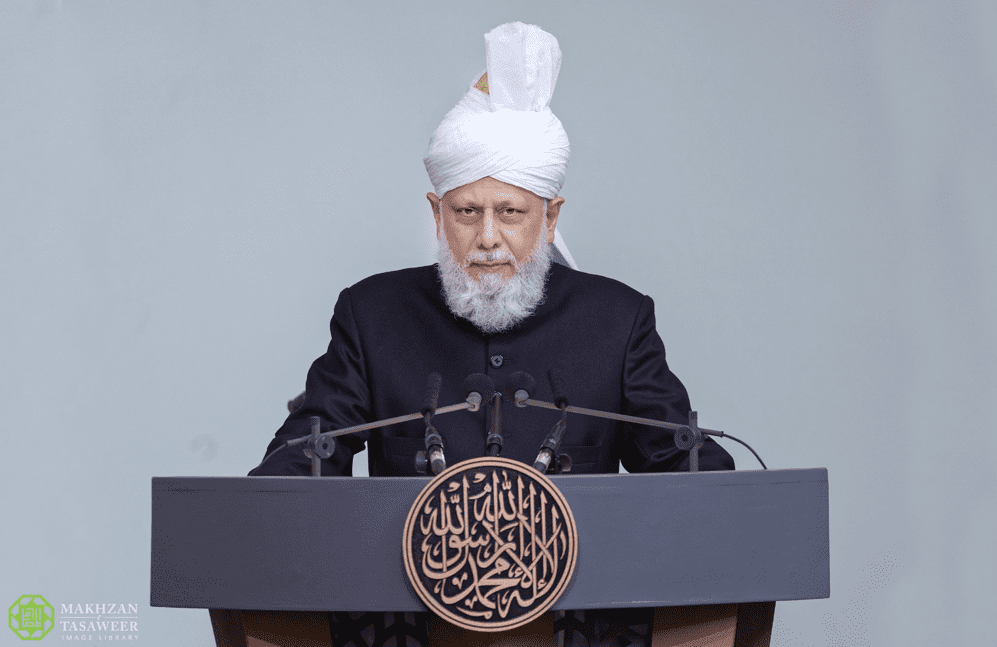Friday Sermon delivered by
Hazrat Mirza Masroor Ahmad(at)
Rightly Guided Caliphs – Hazrat Umar(ra)
After reciting Tashahhud, Ta‘awwuz and Surah al-Fatihah, His Holiness, Hazrat Mirza Masroor Ahmad(aba) said that there was a vast difference in the condition of the Companions(ra) before they accepted Islam and after they accepted Islam.
Revolutionary Change in the Companions After Accepting Islam
His Holiness(aba) quoted the Second Caliph(ra) who said that these were people who were once staunch opponents of the Holy Prophet(sa). Hazrat Umar(ra), for example, set out one day to kill the Holy Prophet(sa). While on his way, he was informed that his sister and her husband had accepted the Holy Prophet(sa), so he detoured and went to his sister’s home first. He reached there and heard the verses of the Holy Qur’an being recited. He confronted his sister and her husband. He then asked to listen to the same verses that were being recited, upon which he was drawn to tears. He then went to the Holy Prophet(sa) and rather than attacking him, pledged allegiance to him.
His Holiness(aba) continued quoting the Second Caliph(ra) who said that such was the condition of companions before accepting Islam. Then, after accepting the Holy Prophet(sa), they underwent a spiritual revolution, not only for themselves, but became a means for others to experience the same spiritual revolution. If one truly has the desire, then they can undergo the same spiritual revolution today.
Hazrat Umar’s(ra) Fear of God
His Holiness(aba) said that Hazrat Umar(ra) truly feared God. Once, someone heard him saying to himself, ‘You are the leader of the believers, you must fear God’. On another occasion, someone heard Hazrat Umar(ra) reciting fervently during his prayer, ‘I only complain of my sorrow and grief to Allah’ (12:87). He could be heard reciting this prayer, by someone who was standing in the last row of the mosque.
His Holiness(aba) said that Hazrat Umar(ra) honoured the family members of those who had presented sacrifices. Once a lady went to Hazrat Umar(ra) and told him that her husband had died, leaving behind young children. He had nothing to his name, and she feared that her children would die of hunger. She also mentioned that her father had fought alongside the Holy Prophet(sa) during the Battle of Hudaibiyah. Upon hearing this, Hazrat Umar(ra) replied that this was a very close relationship, and so he gave her a camel and provisions to last her a year. He said that by the time these provisions finished, Allah would grant her more.
Care for the Elderly
His Holiness(aba) said that Hazrat Umar(ra) also used to tend to the elderly. Once, someone saw Hazrat Umar(ra) entering a home during the night. When he left, that person went into the home and found a blind elderly lady. He asked her why Hazrat Umar(ra) used to come to her home. She replied, saying that for quite some time, he had been helping her with her various needs and tasks.
Tending to the Needs of the People
His Holiness(aba) said that Hazrat Umar(ra) had a profound sense of care for the people. For example, one night, he inquired why a young child was crying. He was informed that the infant did not have any food, as rations had not been stipulated for infant children. At that moment, Hazrat Umar(ra) granted the child’s mother rations for her child and announced that from then on, rations would be stipulated for infant children. This was the same person whom other great leaders were in awe of and feared, yet he did not rest until the child of a bedouin woman was satiated and soundly asleep.
His Holiness(aba) said that once, Hazrat Umar(ra) was walking and took some time to rest against a wall which was close to a home. While there, he heard a mother telling her daughter that she should mix some water into the milk. The daughter said to her mother that Hazrat Umar(ra) had instructed not to mix water with milk. Her mother said that Hazrat Umar(ra) was not present, so it would not be any issue. However, the daughter replied saying it was not right to be obedient in the presence of Hazrat Umar(ra), and be disobedient when he was not present. The next day, Hazrat Umar(ra) sent the marriage proposal for his son to that same girl. This was the standard Hazrat Umar(ra) adopted when looking for matrimonial matches.
Diligence in Ensuring Fairness in Trade
His Holiness(aba) said that Hazrat Umar(ra) would ensure that prices in the market were not unfairly raised or lowered, as is done today. Once, he saw that a merchant was selling grapes at such a low price, that other merchants would not be able to have competitive pricing. Thus, Hazrat Umar(ra) instructed the merchant to increase his pricing.
His Holiness(aba) said that Hazrat Umar(ra) greatly cared and feared for people’s lives during the outbreak of an epidemic. There was a valley named Amwas, from where a pandemic began and spread through Syria, causing many casualties. According to some, there were about 25,000 deaths. Once, Hazrat Umar(ra) set out for Syria, and along the way, he was informed of the outbreak, and consequently returned to Madinah. Hazrat Umar(ra) called the migrants (Muhajireen) for consultation. There were varying opinions, with some saying that they should not fear and move forward, while others were of the opinion that they should return. Hazrat Umar(ra) consulted with the residents of Madinah (Ansar) as well as the elders of the Quraish, and ultimately decided that everyone should go back. Someone asked Hazrat Umar(ra) whether it was possible to divert from the decree of God. Hazrat Umar(ra) said that they were diverting from one decree of God towards another decree of God. This decision was supported by a statement of the Holy Prophet(sa), who said that if an epidemic broke out, people should not go to that area, and those already residing in that area should not leave. Thus, Hazrat Umar(ra) returned, however the soldiers who were already residing in the impacted areas were instructed to stay there. Hazrat Umar(ra) feared for Hazrat Abu Ubaidha’s(ra) well-being, as he was residing in the impacted area. Out of love for him, Hazrat Umar(ra) summoned him, however Hazrat Abu Ubaidah(ra) understood his intention. He replied saying that he understood Hazrat Umar’s(ra) sentiments, but he was one of the soldiers as well, so it was best for him to stay there. Hazrat Umar(ra) was moved by this response, and then instructed that Hazrat Abu Ubaidah(ra) should at least go to an elevated place in the mountains. Hazrat Abu Ubaidah(ra) was working on implementing this instruction, when he fell victim to the epidemic.
Hazrat Umar’s(ra) Prayers Accepted
His Holiness(aba) said that Hazrat Umar(ra) also experienced the acceptance of his prayers. Once there was a famine, and so Hazrat Umar(ra) went out to pray for rain. As he was praying, it started raining and the people rejoiced. It is also related that after the conquest of Egypt, Hazrat Amr bin al-Aas(ra) was informed that the Egyptians had a tradition in order to keep the Nile River flowing. The tradition was that they would take a young girl, adorn her in clothes and ornaments, and then throw her into the river. Hazrat Amr bin al-Aas(ra) said that such innovations would not continue within Islam. Hazrat Umar(ra) was informed and he said that this was the correct response. Hazrat Umar(ra) sent a small note, written from himself to the River Nile, and instructed that it should be thrown into the Nile River. The note addressed the Nile River, saying that if it flowed of its own accord, then it should remain still, but if it was flowing according to the decree of God, then he prayed for God to keep it flowing. It is recorded that the next day, the amount of water flowing in the Nile River significantly increased.
His Holiness(aba) said that once, Qaisar was experiencing an ailment of the head, and despite exhaustive efforts, he could not be cured. It was suggested to him that he should request Hazrat Umar(ra) for help and prayers. Thus, Qaisar sent a messenger to Hazrat Umar(ra). Hazrat Umar(ra) thought that Qaisar was a prideful person, and would not have come to him had he not been in some sort of trouble. Thus, Hazrat Umar(ra) thought to send something that would be blessed, but also break the arrogance of Qaisar. Thus, Hazrat Umar(ra) sent him one of his old tattered hats. Upon seeing it, Qaisar refused to wear it, but later when his pain increased, he had no choice but to wear the hat, and his pain went away. This pain would return after every few days, and so after every few days, Qaisar would wear that same tattered hat.
His Holiness(aba) said that Hazrat Umar(ra) upheld the honour of the Holy Prophet’s (sa) mosque. Once, there were two people speaking loudly in the Prophet’s mosque. He asked for them to be brought to him, and asked them where they were from. They said they were from Taif. Hazrat Umar(ra) told them that had they been from Madinah, he would have punished them for speaking so loudly in the Prophet’s (sa) mosque. Similarly, when leading prayer, Hazrat Umar(ra) would not begin the prayer until he ensured that all the rows were straight.
His Holiness(aba) said that he would continue highlighting incidents from the life of Hazrat Umar(ra) in future sermons.
Summary prepared by The Review of Religions

